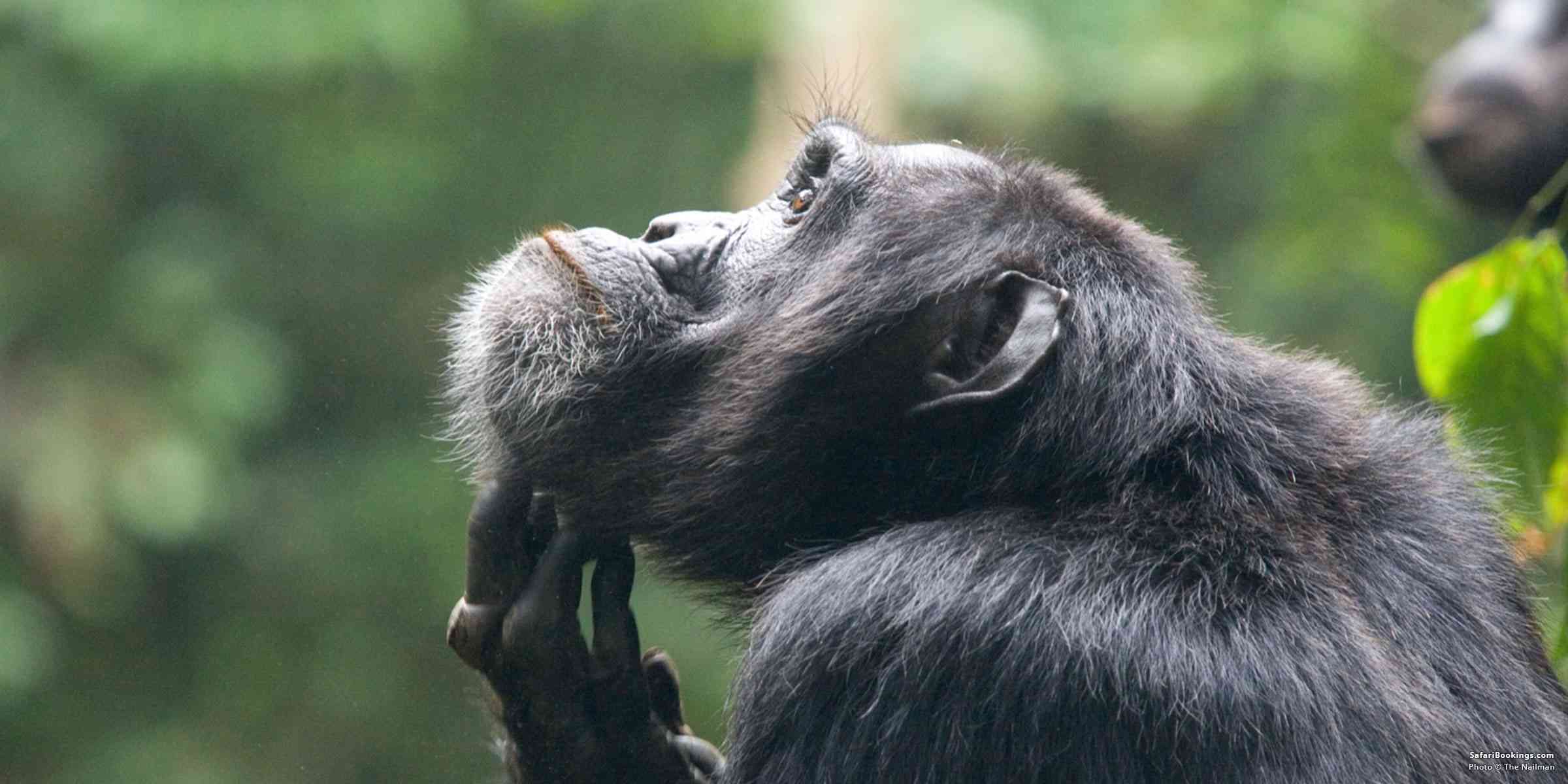
5 Fascinating Facts About the Common Chimpanzee
 By Mike Unwin
By Mike Unwin
Mike is an award-winning wildlife writer, former editor of Travel Zambia magazine and author of the Bradt Guide to Southern African Wildlife.
Chimpanzees stand alongside gorillas as Africa’s only great apes and are the closest living relatives of humans. The common chimpanzee (Pan troglodytes) is the best known and most widespread of two species – the other being the bonobo, which is smaller, less aggressive and forms female rather than male-dominated societies.
The close affinity of chimps with humans is evident in many aspects of their behavior, from their large brains and complex social intelligence and communication skills, to their ability to fashion and use tools. It has also explained the many ways in which people have exploited them, whether as objects of circus entertainment, or subjects for laboratory experiments.
Both chimpanzee species are listed as endangered by the IUCN and confined to Africa’s equatorial rainforests. Common chimpanzees live to the north of the Congo River and range across 20 countries, from Senegal in the northwest to Uganda, Rwanda and Tanzania in the southeast. By contrast, bonobos are endemic to the Democratic Republic of the Congo and only occur south of the river. An estimated 200,000 to 300,000 common chimpanzees and 50,000 to 60,000 bonobos remain in the wild. Below are five fascinating facts about the common chimpanzee.
- Taxonomists classify the chimpanzee genus Pan as part of the tribe Hominini, which also includes humans. The linages of chimps and humans are thought to have separated some five to 12 million years ago. The most recent molecular research concludes that the difference in DNA between humans and chimps is no more than 1% to 1.2%.
- A variety of tools used by chimpanzees include sticks of different lengths, with which to both break into termite mounds and fish out the termites; stones of different sizes that serve as both hammer and anvil for breaking open nuts; leaves used as sponges or spoons to collect and drink water; and pointed sticks (sharpened by the apes’ teeth) with which to spear bushbabies and squirrels from small tree holes.
- Experimentation on all great apes (in practice, chimps) was banned by the European Union in 2010. It continued in the US, however, where at that time there were more than 900 chimpanzees housed in laboratories. In 2015 the US National Institute of Health (NIH) concluded that experimentation on chimpanzees was no longer required. To this day, many chimps remain in warehouses because of the difficulties involved in rehousing them.
- During the 1960s, researchers Allen and Beatrix Gardner spent 51 months teaching American Sign Language (ASL) to a chimp named Washoe. Over this time Washoe learned 151 signs and spontaneously taught many of them to other chimpanzees. By the end of her life, Washoe had mastered over 800 signs.
- Research from the Tai National Park in Côte d’Ivoire has concluded that a form of prostitution exists among the chimpanzees there, in which females use sex to buy meat from males – often doing so on a long-term basis.
Want To Go Chimp Trekking in Africa?
Click on the button below to compare African chimpanzee trekking safaris offered by top-rated tour operators.
 By Mike Unwin
By Mike Unwin
Mike is an award-winning wildlife writer, former editor of Travel Zambia magazine and author of the Bradt Guide to Southern African Wildlife.
More About This AuthorAfrican Safari Tours
-
![7-Day Big Five Exploration Tanzania Safari Experience]()
7-Day Big Five Exploration Tanzania Safari Experience
$2,137 pp (USD)
Tanzania: Private tour
Mid-range Lodge & Tented CampYou Visit: Arusha (Start), Tarangire NP, Central Serengeti NP, Ngorongoro Crater, Lake Manyara NP, Arusha (End)

Paws and Claws Safaris
5.0/5 – 15 Reviews
-
![8-Day Private Mid-Range Serengeti Wildebeests Migration]()
8-Day Private Mid-Range Serengeti Wildebeests Migration
$2,860 pp (USD)
Tanzania: Private tour
Mid-range Lodge & Tented CampYou Visit: Arusha (Start), Tarangire NP, Serengeti NP, Ngorongoro Crater, Lake Manyara NP, Arusha (End)

Meru Slopes Tours & Safaris
5.0/5 – 464 Reviews
-
![11-Day Tanzania Safari with Zanzibar Beach Break]()
11-Day Tanzania Safari with Zanzibar Beach Break
$9,199 to $12,299 pp (USD)
Tanzania: Private tour
Mid-range Lodge & Tented CampYou Visit: Arusha (Start), Tarangire NP, Lake Manyara NP, Ngorongoro Crater, Serengeti NP, Zanzibar (End)

Wayfairer Travel
4.8/5 – 185 Reviews



 Subscribe to our newsletter
Subscribe to our newsletter
 Follow us on Instagram
Follow us on Instagram



_1813_5e20b935b89f3.gif)

